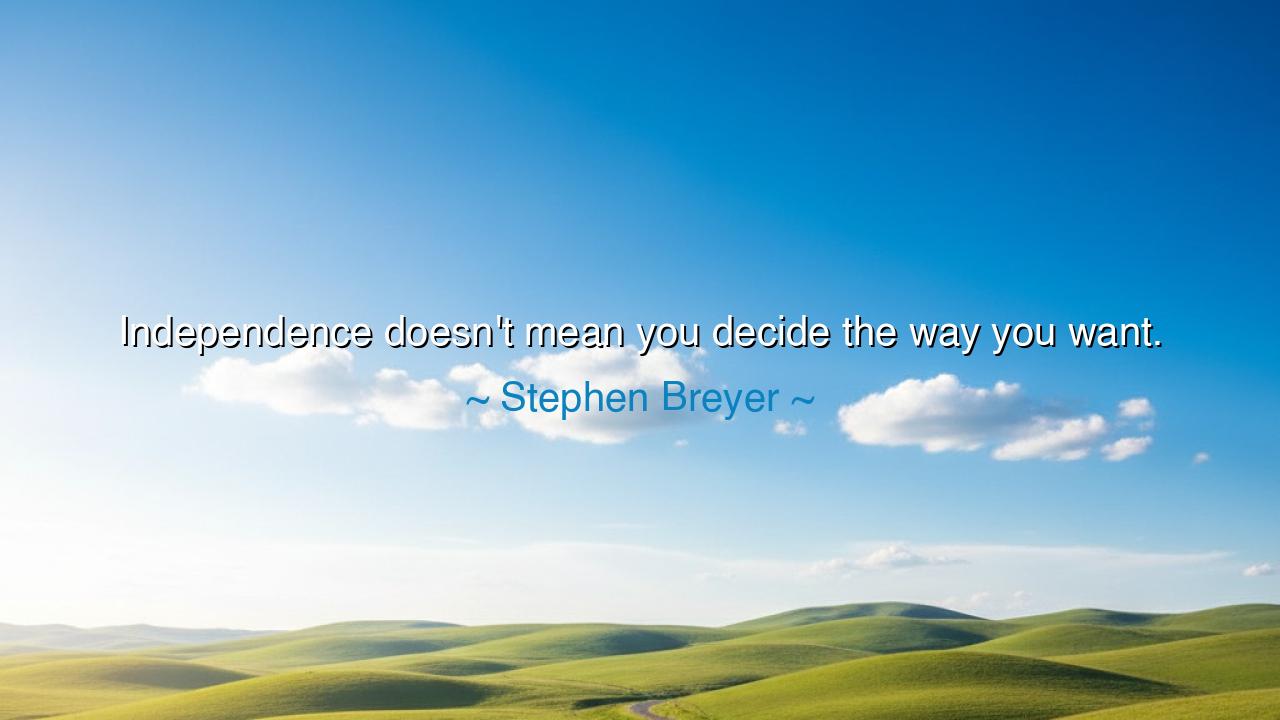
Independence doesn't mean you decide the way you want.






There are moments when the truest wisdom sounds almost like a paradox — when freedom reveals itself not as license, but as discipline. When Justice Stephen Breyer declared, “Independence doesn’t mean you decide the way you want,” he spoke as one who has spent a lifetime standing at the crossroads of law and conscience. His words are not merely about the judiciary, though they arise from it; they are a reflection of a timeless truth — that independence, whether of a judge, a nation, or an individual, does not mean the freedom to follow whim or desire. True independence is the power to act rightly, bound not by external command, but by internal principle.
The origin of this idea lies deep in the heart of justice itself. As a Supreme Court Justice, Breyer understood that independence of the judiciary was one of the pillars upon which democracy stands. Yet he also knew that independence, without responsibility, can turn to arrogance, and that liberty, unmoored from law, becomes chaos. When he said, “Independence doesn’t mean you decide the way you want,” he meant that even those who are free from political influence are still servants — not of power, but of truth. The judge must not decide as he pleases, but as the law commands and the Constitution demands. His independence is not the right to rule by will, but the duty to reason with justice.
This distinction is as ancient as civilization itself. When Solon, the Athenian lawgiver, crafted the first democratic codes of Greece, he too understood this paradox. He gave his city freedom from tyranny, but bound it to laws that even rulers must obey. Solon once said that liberty without law is anarchy, but law without liberty is slavery. Thus, the balance between independence and restraint became the soul of democracy — a balance Breyer echoed across the ages. To act rightly, one must be free from coercion; yet to remain righteous, one must also be bound by conscience and rule.
The same truth holds beyond courts and constitutions. Consider the life of George Washington, the general who won America’s independence and the president who defined its limits. When offered the crown, he refused it. When his second term ended, he stepped down though no law required him to. His restraint became his greatest act of freedom. Washington knew, as Breyer would centuries later, that independence is not self-indulgence, but self-governance — the mastery of the self by principles higher than ambition. He could have ruled as he wished; instead, he chose to serve as he ought. That is the noblest form of independence.
Breyer’s wisdom, though born in the halls of law, belongs to every sphere of human life. The artist, though free in imagination, must submit to craft; the scientist, though daring in discovery, must yield to truth; the citizen, though blessed with liberty, must live with virtue. To be truly independent is not to escape limits, but to choose the right ones. For independence that seeks no guidance becomes mere rebellion; freedom that heeds no standard becomes destruction. True independence is bound by duty, just as a river is bound by its banks — not to restrain its flow, but to give it direction and power.
History teaches this lesson again and again. When leaders confuse independence with dominance, nations fall. When individuals mistake liberty for indulgence, character decays. Yet when men and women understand that freedom is inseparable from moral responsibility, civilization endures. The independence that Breyer describes is not the roar of defiance, but the calm strength of integrity — the power to choose what is just, even when it is not easy, even when it is not desired.
So, my child, let this truth guide you as it guided the wise before you: independence is not the right to do whatever you please; it is the strength to do what is right. Guard your freedom not with pride, but with humility. Seek not the power to decide as you wish, but the wisdom to decide as you ought. Whether you sit upon a bench of justice, walk the path of leadership, or simply live as a citizen among others, remember — independence without virtue is an empty throne, but independence guided by principle is the crown of a free soul.






AAdministratorAdministrator
Welcome, honored guests. Please leave a comment, we will respond soon